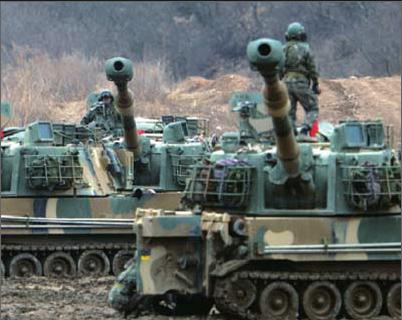NUCLEAR SHOWDOWN
2016-03-29ByShiYongming
By+Shi+Yongming

The UN Security Councils (UNSC) adoption of Resolution 2270 which imposes the strictest sanctions against the Democratic Peoples Republic of Korea (DPRK) to date for its development of nuclear weapons, fueled speculation about the future of the relationship between China and North Korea.
China, perceived as a long-time “ally” of North Korea by many Western powers, supported the March 2 UNSC resolution on North Korea. But sanctions are not an end in and of themselves, as Chinese Foreign Minister Wang Yi said. China urges all parties to make concerted efforts to solve the issue through negotiations, as the resolution calls for.
A difficult task
The DPRK, also known as North Korea, was denounced for violating the September 19 Joint Statement reached by all six parties in 2005, in which the country promised to abandon all nuclear weapons and existing programs.
Its irresponsible behavior can also be partially attributed to the hardline policies the United States has adopted against it.
The DPRKs path toward nuclearization is complicated. While China understands its demand for safeguarding its national security, North Koreas way of confronting the United States is unwise and reckless. As far as national strength is concerned, the DPRK is too weak to challenge the United States, the worlds only super power.
North Korea should have made efforts to win international support and sympathy through diplomatic means. But instead, it has fallen into isolation over the last few years due to its obsession with nuclear weapons. On the surface, the countrys leadership has obtained more strength and shored up domestic support through recent nuclear tests. Regardless, its reputation abroad has been severely tarnished. It was then followed by the UN adoption of the strictest economic sanctions on the country in decades.
More importantly, North Koreas nuclear tests have inadvertently provided reasons for the United States to enhance its military presence in the Korean Peninsula. North Korea has fallen into a vicious circle of nuclear tests, but its nuclear program will not be able to help the country improve its comprehensive security situation. On the contrary, it is worsening: Trying to get rid of a “U.S. threat” by enhancing their nuclear program would only trigger greater hostility in the region.
The latest hydrogen bomb test on January 6 is the fourth time North Korea has conducted a nuclear test. It implies a dangerous tendency in North Koreas security policy. That is to say, the country flaunts its capabilities regardless of the risky consequences, including widespread disapproval from the international community.
Some might urge China to influence North Korea directly, but that is barely possible. To understand the reality, people need to look back into history to learn about the evolution of bilateral relations between China and North Korea.
A loose coalition
At the end of World War II (WWII), the United States and the Soviet Union kicked off largescale competition over spheres of influence. In East Asia, Koreans were divided into the North and the South due to the confrontation between the two great powers. The following ideological division during the establishment of governments in the Peninsula then enhanced the split and hostility against each other.
Under such circumstances, a conflict was inevitable. The Korean War (1950-53) was a civil war at the beginning, but the United States soon got involved because it believed the war concerned U.S. interests in East Asia.
In the name of defending the free world, the U.S.-led, multinational army attacked North Korea and pushed the battlefield forward to the Yalu River, a boundary river between China and North Korea, which then threatened the security of the newly established Peoples Republic of China. Consequently, China joined the war in order to protect its homeland and aid North Korea. As a Chinese saying goes, if the lips are gone, the teeth will feel cold. Therefore, China and North Koreas security interests became intertwined.
After the fighting stopped, North Korea and South Korea went back to their original borders as they were before the war. But the security architecture in the Peninsula had changed. The United States and the Republic of Korea (ROK), or South Korea, formed a close military and political alliance that continues to this day.
Meanwhile, the people of China and North Korea forged a close friendship, or brotherhood, during the war. The two countries agreed to help each other on the basis of equality, but never established a military alliance with a joint defense treaty like that of the United States and South Korea. Furthermore, after the Chinese peoples volunteer soldiers withdrew from North Korea in 1958, North Korea had in effect restored its independent defense capabilities.
In theory, there are two basic factors that the China-DPRK relationship was founded on. First, non-interference was an important pillar. Although both are socialist countries, they harbor the belief that all nations are independent and equal. This belief was also an important ideological weapon for developing countries, known at that time as the “Third World,” to use in their fight against imperialism and colonialism during the Cold War period.
The other critical factor was that the DPRK is keenly alert of the possible influence a neighboring big country may have on it. Its leaders have always emphasized the importance of independent decision-making and have taken many acts to get rid of flunkeyism—relying on a big country for help.
With regard to its national defense, the North Korean Government stresses unilateral security much more than common security. During the Cold War, the friendly relationship between China and the DPRK was formed on the basis of mutual respect, particularly in re- gards to Chinas respect for North Koreas spirit of adherence to self-determination.
Post-Cold War transformation
After the end of Cold War, regional tensions and international relations in East Asia were greatly improved. The old world order also began to change.
Against this backdrop, there was a natural incentive for China to develop normal relations with South Korea, in an effort to seek reconciliation and end military hostility in the peninsula. Without question, a separated and unstable Korean Peninsula is not good for Chinas prosperity, nor its security. Predictably, North Korea was extremely discontent with the establishment of ChinaROK diplomatic relations in 1992.
When North Korea tried to seek alleviation of security pressures through negotiations, hardliners in the United States dismissed any positive gestures by the DPRK. Furthermore, the hawkish policies of the U.S. Government on the nuclear issue intensified tensions on the Korean Peninsula. As a result, any reconciliation process between the North and South has stalled.
That being said, North Koreas non- transparent defense policy and nuclear program has become a legitimate concern for the international community. So the United States has gained some support in enhancing its military deterrence force against the DPRK on the Peninsula.
Looking forward
China is willing to play a constructive role as a mediator in the affairs in order to maintain peace and stability in the peninsula. However, the stalemate between the DPRK and the United States leaves little room for China to try dissolving the hostilities in the peninsula. It is also hard for China to coordinate policies with a potentially unpersuadable North Korea.
Even prior to the unanimous adoption of the latest UNSC resolution on the DPRK, Foreign Minister Wang anticipated that a new round of international sanctions on the DPRK would have a significant influence on ChinaDPRK relations.
In the past, Chinas economic support for North Korea was due to its special relations with the country. Today, Chinas aid to North Korea will be conducted under the UNSC resolutions. At the outset of this century, China-DPRK relations have been shifting toward an ordinary bilateral status as the characteristics that would normally define an “alliance” have been gradually disappearing in light of North Koreas disregard of international law.
Nevertheless, China will continue its efforts to bring all parties to the negotiating table. Indeed, a conflict-free and denuclearized Korean Peninsula will be a cornerstone of Northeast Asias peaceful and prosperous future.
